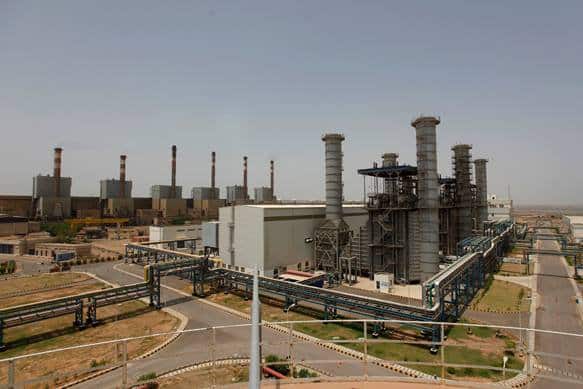ISLAMABAD: In a major breakthrough, the authorities successfully completed a Reliability Run Test (RRT) at the Haveli Bahadur Shah Power Plant in Jhang, Pakistan, marking the completion of the 1,230 megawatts (MW) power plant.
The completion of Haveli Bahadur Shah Power Plant is a good news for the country ahead of the summer season which would help meet its growing electricity needs as the PML-N government goes for the upcoming general elections.
The plant has been jointly developed by SEPCOIII and General Electric (GE) Power (NYSE: GE). The RRT is a critical milestone towards the completion of the plant, which is being developed by the Government of Pakistan through the National Power Parks Management Company Limited (NPPMCL).
The project is among the largest gas-fired combined cycle plants in the country, expected to add up to 1,230 megawatts (MW) to Pakistan’s national grid – the equivalent power needed to meet the electricity needs of up to 2.5 million Pakistani homes.
This would be the second major power plant in Punjab as the province already has seen the early completion of Sahiwal Coal-Fired Power Plant which is producing 1,320 megawatts of power for consumers.
SEPCOIII Electric Power Construction Co., Ltd (SEPCOIII) is the engineering, procurement and construction (EPC) contractor for the project, responsible for setting up the power plant. It is a wholly-owned subsidiary of Power Construction Corporation of China with a professional engineering enterprise in the electric power sector and includes EPCO, EPC, BOT, BOO and PMC.
Founded in 1985, SEPCOIII has aggregated installed capacity of 86,000 MW and was ranked 58th in the Top 250 International Contractor of ENGR (Engineering News Record) in 2014. At present, its customer base has spread across 18 countries through 46 turn-key projects including India, Nigeria, Pakistan, Bangladesh, Kuwait, Myanmar, Jordan, Saudi Arabia, Oman, Iraq, Egypt, Morocco, Turkey, Indonesia and Singapore etc.GE is providing two of its advanced H-class heavy-duty gas turbines, one steam turbine and two heat recovery steam generators (HRSGs) for the plant.
“We are committed to meeting the growing demand for power in Pakistan to drive industrial growth, economic progress and the welfare of our people,” said Rashid Mahmood Langrial, CEO of NPPMCL. “I am pleased to note that working together with SEPCOIII and GE, we are setting up the Haveli Bahadur Shah project maintaining the highest standards of quality and excellence. The facility will soon help to meet up to 20 percent of the energy shortfall in the country,” he added.
The RRT at the HBS site involved continuous plant operations under real conditions, without any failure, for a period of 7 days. The successful completion of the RRT demonstrates that the power plant is operational to the highest standards of safety and security.
It also marks the completion of all major commissioning activities at the site. Following the RRT, the power plant will undergo a performance test where specialized, calibrated instrumentation will be used to measure important performance-related indicators such as output and efficiency levels. The performance test is expected to take place in April 2018, following which the plant should reach full-fledged commercial operations and feed power to the national grid ahead of summer 2018.
Project Director of HBS 1230 MW RLNG Combined Cycle Power Plant Project from SEPCOIII, Wang Zengxu said almost as large as 65 football fields, more than 10 million man-hours and staff from over 35 countries came together to set up the Haveli Bahadur Shah Power Plant.
“The project is a strong example of bringing the world’s best together to power Pakistan. By deploying leading Chinese engineering skills, advanced American and European technologies, as well as local staff with knowledge of on-the-ground conditions, we are building the most efficient combined cycle power plant in Pakistan today.”
“As a committed partner in Pakistan’s progress and development, we understand how critical it is to bring the latest technologies to meet the country’s rising energy needs. GE’s HA gas turbines have helped set a world record for combined cycle power plant efficiency in France and we are proud to help set a new industry benchmark in Pakistan by bringing efficient, affordable, reliable and sustainable power to the country,” said Mohamad Ali, President and CEO of GE’s Gas Power Systems – Projects Business in the Middle East, Pakistan and India.
GE’s HA technology has undergone full-speed, full-load validation tests at GE’s Greenville, South Carolina facility in the United States at extreme conditions well beyond those encountered while in service. More than 75 units have been ordered to date by over 25 customers across more than 15 countries, including the United States, Mexico, Brazil, Pakistan, Japan, Bahrain, China, France and others. Among its many benefits, the HA can ramp up or down quickly, while still meeting emissions requirements to help balance grid instability. It thus offers an excellent flexible complement to intermittent renewable sources as Pakistan and other countries across the region increase the proportion of alternative energy.
The technology is also being used at Pakistan’s upcoming Bhikki and Balloki Power Plants. Together, HBS, Bhikki and Balloki will add up to 3,600 MW to Pakistan’s grid, going a long way towards helping the government realize its goal under Vision 2025 to enhance access to electricity to over 90 percent of the population.
GE has supported the development of energy, transportation and healthcare infrastructure in Pakistan for more than 50 years. Today, GE-built technologies can generate the equivalent power needed to supply up to 25 percent of the country’s electricity.




